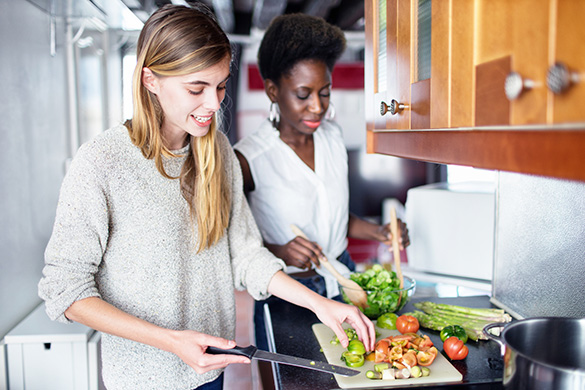
Instead of focusing on the foods we eat, look at ways to make healthy habits more accessible.
We can concentrate on making changes in areas like:
- When
- Where
- How
- Who we eat together
Take a look at the questions below. Your answers could help you to make changes and improve your diet.
What Time Do You Eat?
Some of us are all-day grazers. Others have three solid meals, and that’s it. Some people eat one meal per day. This may not seem like a serious environmental issue. Ivan Pavlov demonstrated that dogs can associate the sound of a bell with being fed.
It’s extremely likely we all have some similar conditioned stimuli to food. The question is:
- Am I eating as a response to my body’s hormonal request for nutrition, or
- Do I eat because I hear the intro of the TV show I am watching with dinner?
- What time do you shop for groceries?
This question is not as straightforward. There are a lot of marketing strategies and science that can work against you when you go to a grocery shop. This is more about finding the right balance between buying fresh foods as often as possible and not purchasing impulse items too often.
Always avoid shopping when you’re hungry.
When do you dine out?
The occasional date night or evening out with friends is part of a healthy relationship with food, and won’t drastically change our health or weight. However; if you dine out regularly for your job, have a full social calendar or find it much simpler to swing through somewhere and pick up dinner, it’s key to make good choices. They might include sticking to specific restaurants, looking at the menu online and deciding what you will be having ahead of time or ordering first so you aren’t tempted by the choices others make.
Where do You Eat Your Meals?
This question should be answered in detail. Is it a kitchen table or a living room recliner? Do you prefer a table near the window, or in the back when you dine out?
Although these small details can have a huge impact on food choices, they can have a big impact on temperature, lighting, and plate color.
Where do you keep the food you want most?
The subtitle to this question should say, “Foods you want most, but really shouldn’t have.” Think of the saying: “Keep your friends close, but your enemies closer.”
People find it easier to control their eating habits when they know what foods are available. But it’s important to consider your own personal relationship with food. If you would never make a special trip for a sweet treat – or salty snack – it may be best to keep them out of your environment.
How do you eat?
How do you feel when your indulge or overeat? These questions are less about the discomfort and bloating, but more about your emotions. Many people experience tremendous guilt when they indulge, and that isn’t part of a healthy relationship with food.
Everyone indulges now and then – even dietitians!
How does your environment influence your choices? This question is also meant to help you spot any conditioned stimuli, mindless habits, or ways that you are influenced by your surroundings.
Or, when your parents come to visit, you can’t get enough to eat. What is it about these environments that makes healthy choices more difficult for you?
Who is there to join you when you eat?
Who can you trust to make a difference in your life? It is going to be easier to change if you surround yourself with people who have healthy habits and support your efforts.
Who can influence your decisions? There are many people who use food as a sign to love and food pushers. They might not be trying to undermine your efforts but they can make it much more difficult to make healthy changes.
Who is a role model for the behaviors you want to emulate? No one’s life and relationship with food should be used for comparison; however, other people can be used as guideposts to help discover new habits.
They might have healthy ways of living that are a good fit with your life.
Lauren Cornay, Avera Heart Hospital South Dakota Dietitian – Learn more about nutrition for your health.
